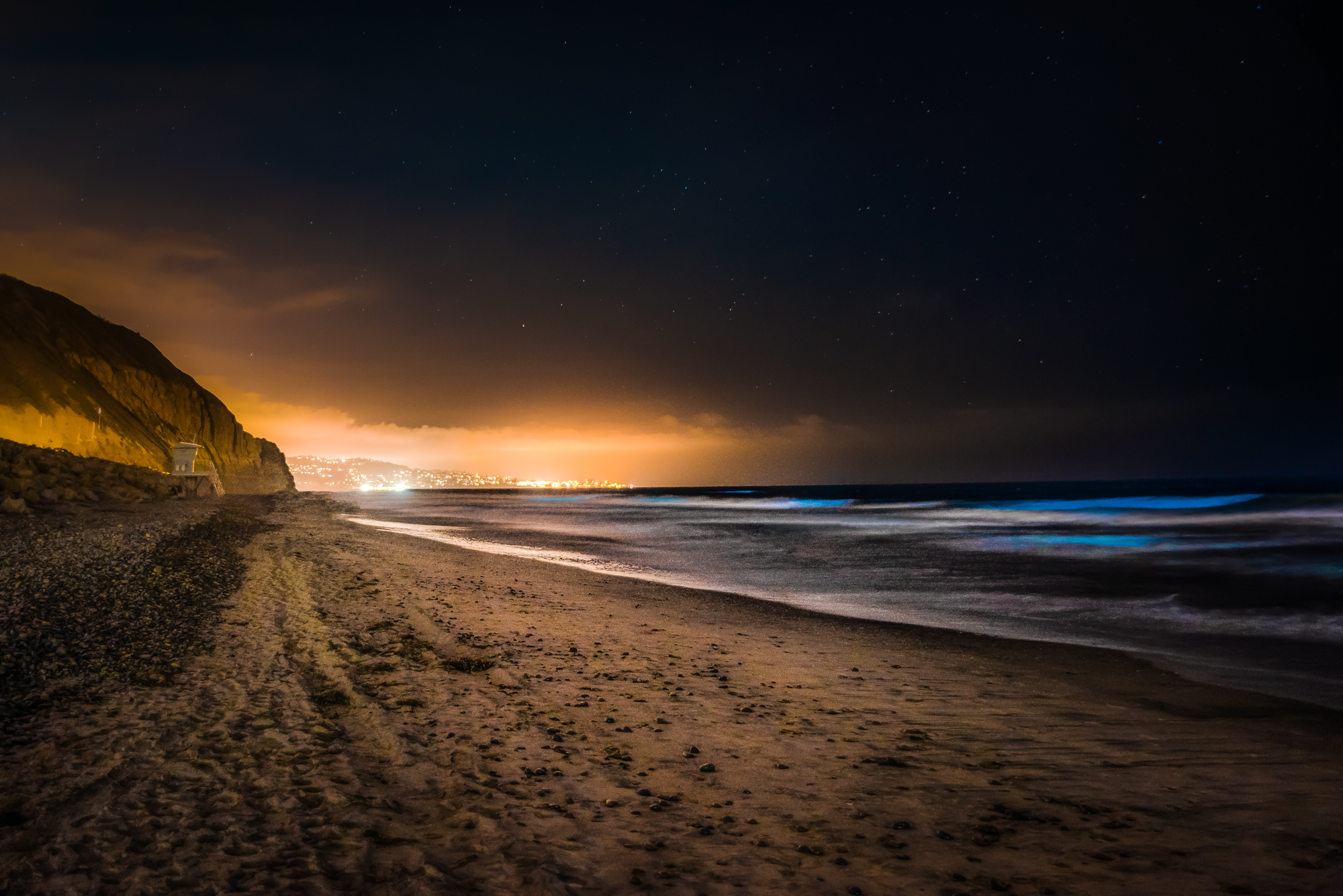What is red tide?
According to scientists at Scripps Institution of Oceanography at UC San Diego, the red tide is caused by aggregations of dinoflagellates which are well known for bioluminescent displays with waves or movement in the water. This casues the phytoplankton to glow neon blue at night (https://scripps.ucsd.edu/news/red-tide-brings-bioluminescence-san-diego-beaches). So basically, tiny little organisms out in the lineup were having chemical reactions resulting in neon blue waves. So epic!
In May of 2018, the rare phenomenon known as the red tide hit the coast of San Diego and it was every bit as beautiful as it sounds!
The image below was taken at Torrey Pines State Park on the second night of the algae bloom (Tuesday May 8th, 2018)
Photo Tip: This image was taken at 5 sec @ F8, ISO 2000, Focal length 35mm. I shot this composition several times to capture multiple algae aggregations. Then, I stacked the images on top of one another in post processing.
Creating abstract images at blacks beach
It was around 9:00 pm on Tuesday when it started to get busy. Every person that parked along the coast road to observe the red tide would make it disappear. Their car headlights would kill the biolume. So I walked south towards blacks beach to find a dark area to create some abstract images. I was really lucky to get great conditions. There were no clouds, less people and I had some time to just take in this natural wonder. I am guessing that's why the images featured below are my favorite of the entire event.
Photography is a blessing and a curse... or more like a blessing and sometimes a slight inconvenience. My passion to create inspires me to get out and experience this type of amazingness. It forces me to stay updated on astronomical events like meteor showers, lunar eclipses, and supermoons. Also things like weather patterns, swells, tides or random events like when the sun happens to aline perfectly under a local pier. I'm always looking to capture mother nature being the total weirdo that she is, and I love it. With that comes the immense amount of pressure I put on myself to create something that is awe inspiring. Shortly after my blissful experience my mind started to go into overdrive. What else could I do that is unique? Is there another vantage point? What hasn't been done before? and the big question...should I swim out into the dark? With my location getting busier by the moment I created a few more images before packing up my gear and heading to a new spot.
Out of focus speed blur? Why not!
What you're looking at (below) is the marine layer starting to roll in over downtown La Jolla with a bioluminescent wave breaking on the far right. I created this shot by making sure everything was out of focus, I then zoomed in with my telephoto lens @ F8 for 10 seconds. I was doing slight panoramic motions with my camera on a tripod to create a dramatic image.
The Marine layer rolled in really quick. I did some long exposures over looking downtown La Jolla from the Torrey Pines Gliderport. The clouds absorbed the light and it ended up reflecting the light back on to the ocean. This in itself is pretty amazing- isn't it? Unfortunately, it had a negative effect on the amount of luminosity we were able to see. I managed to capture a few bright algae aggregations and a lot of detail in the foreground. I love how this image came out.. it almost looks like a sunrise.
View from the Torrey Pines Glider Port
Photo tip: This image was taken at 180 sec @ F11, ISO 2000, Focal length 14mm. By doing long exposures, I was able to capture multiple algae aggregations in one image. I was also able to get a lot of detail in the foreground and interesting colors in the clouds.
Quick side story...
I had an internal debate with myself on whether or not I should put my camera in my water housing, get my wet suit on and swim out to get some photos. There was a lot to consider and ultimately I decided to move on to a new location and try the water shot the next night...unfortunately that chance never came. I did however get to experience the biolume from the water on Monday night while out on a different assignment before most of San Diego realized we had a red tide.
Flashback to Monday night
Considering the Biolume is unpredictable, I had no clue this was all happening. I was out late Monday night working on some images for another project I am in the middle of. I was shooting some flash photography with a group of talented surfers in a secluded location off of La Jolla. The water was really murky but I didn't think much of it.. We photographed until dark but the algae had not yet illuminated. On the way back I clung to a raft being towed behind a jet ski with all of my camera gear. My lower body was completely off the raft and as we drove over the massive deep water canyons off the coast of La Jolla-all me and my buddy could come up with to talk about was sharks. All of a sudden, I was distracted by the water behind the jet ski turning bright blue. We were all stoked but I don't think any of us realized how amazing this actually was. How many people can say they have driven a jet ski through a Bioluminescent algae outbreak? My guess is not too many! My flash kept killing the colors but I managed to get a couple shots with a lower power output on my flash. This was actually a learning experience for me. I now have a good idea for what will work and what won't out in the the water on the next biolume.
On the left is the last shot I took before we made the trip back. I can't help but wonder what would have happened if we photographed a half hour longer.. would we have scored the photos of a lifetime?? The shot on the right is the only shot I got with the illuminated jet ski!
I am beyond grateful to witness such beauty in nature. The next two nights the biolume faded significantly and the beaches were lined with spectators so I opted out of shooting. I accomplished the shots I envisioned from the last time I saw the biolume in 2011. One thing is certain for next time. I am without hesitation swimming out and photographing from the in-water angle!








